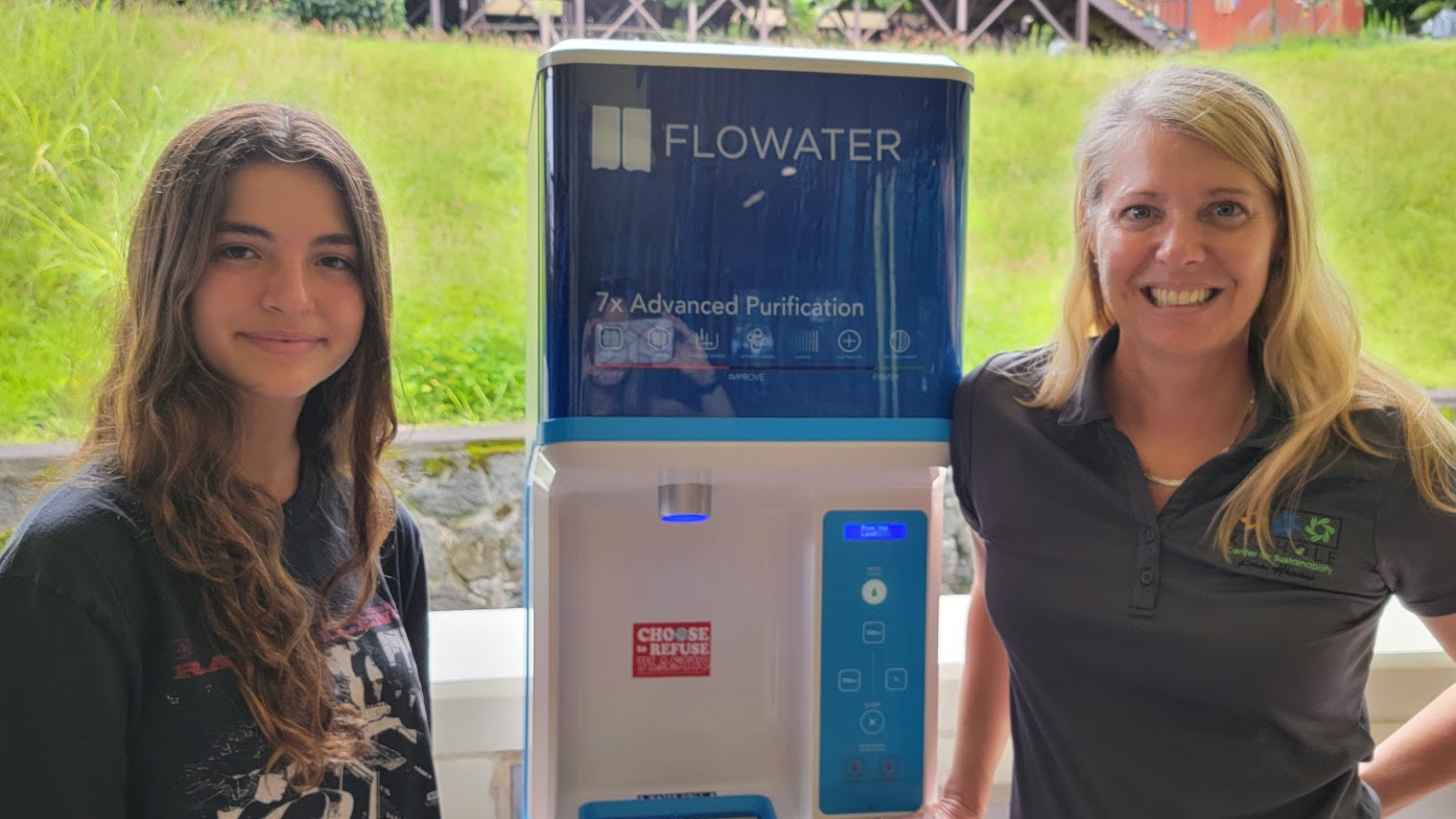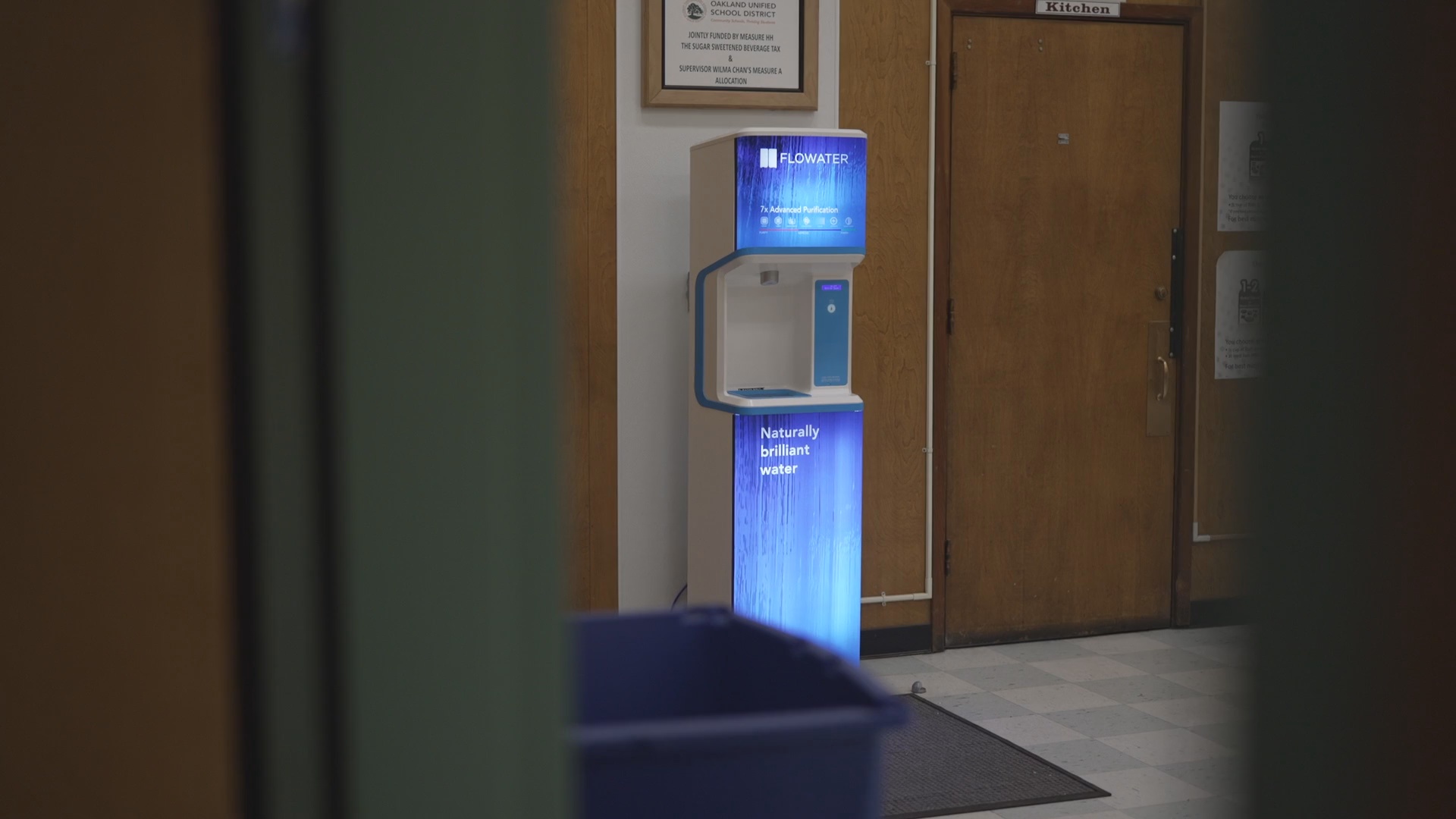- Hawaiʻi Preparatory Academy student Nikki Montenegro helped bring about the installation of new water refill stations at various schools on Hawaiʻi island, helping to reduce plastic waste.
- The Water Refill Community Sustainability Action Program was started and inspired through a Keahole Center for Sustainability mentorship with Montenegro.
From the Keahole Center for Sustainability:
On Friday, Sept. 2, Keahole Center for Sustainability (KCS) is installing two new water refill stations at Waimea Middle Public Conversion Charter School and one at Waimea Elementary School through a grassroots effort spearheaded by a local high school student.
“I want to reduce single-use plastic water bottle usage and disposal while increasing the quality of health for all local keiki on our island,” says Nikki Montenegro, junior project manager at Keahole Center for Sustainability. “And this water refill unit is just one of many to be donated and locally installed this year.”
To date, the ambitious project has installed FloWater filtered refill units at Hawaii Preparatory Academy (HPA) and Holualoa Elementary School with more unit installations on the drawing board for West Side schools this fall. The effort has been lauded by Governor David Ige and was recognized this summer by the Kona-Kohala Chamber of Commerce with a Pualu Award for Business Innovation; the award recognizes businesses and organizations that work together in providing business leadership and community service.
KCS, a local non-profit, oversees and facilitates this new initiative to donate water refill stations to every school in Hawaii. Dubbed the Water Refill Community Sustainability Action Program, the project was recently started and inspired through a KCS mentorship with Montenegro, who wanted to think up a community impact project related to reducing plastic waste. The HPA student was saddened to see plastic on local beaches and when diving the shoreline.
KCS Executive Director Candee Ellsworth worked with the student to observe how plastic was used here in the community, identify the problem and possible reasons for it, and brainstorm solutions. Over the span of several months, Ellsworth helped the teen narrow her focus to reducing single-use plastic water bottle usage first on the Island of Hawaii.
“If every student in Hawaii schools were to bring one plastic bottle of water daily for the 173 days of a typical school year, it would generate 5.19 million plastic water bottles going to our local landfills,” notes Montenegro. “Single-serve plastic water use is where we can quickly make a huge local impact, not only for reducing plastic waste, but also for improving the health of residents.”
Ellsworth explains the twosome decided it was important to replace the single-use water bottle usage in schools with water that was fresh, clean and tasted good. They found the remedy was providing filtered water stations instead of a water bottle refill source like a drinking fountain or straight from the tap.
“Many of the schools here on the island have very old infrastructure and Nikki wanted the water provided to be safe, and for students and school staff to perceive it as safe as well,” details Ellsworth. “Nikki has personally fundraised and spearheaded this effort with a passion that is refreshing to see in a young community member.”
According to Ellsworth, many Hawaii Island schools are between 50-80 years old, and even if they have been remodeled, the existing infrastructure could be decades old. She says they chose to utilize FloWater units as they were inspired by a local Hawaii entrepreneur. The units provide water that passes through a seven-filter system that alkalizes and adds electrolytes in the final process, providing a healthy alternative while helping to reduce single-use plastic waste.
“This new grassroots effort will not only help the health of our island home’s environment, but that of our keiki and community members as well,” continues Ellsworth.
Funding of the project has been through private sources and grants. Those wishing to donate can do so through the KCS website under “Sustainability Action” at http://kcshi.org. School administrators and parent/teacher organizations interested in obtaining a FloWater unit for their schools can contact Ellsworth at kcs@kcshi.org.
Keahole Center for Sustainability (KCS) is a local, private nonprofit located at the Natural Energy Laboratory of Hawaii Authority’s Hawaii Ocean Science and Technology Park in Kailua-Kona. They host educational programming and community outreach programs. KCS’s mission is to promote education and advocacy through the culturally sensitive and environmentally sound use of sunlight and seawater for a sustainable future for Hawaii, and to highlight and perform sustainability action within our community.



by Big Island Video News12:29 pm
on at
STORY SUMMARY
WAIMEA, Hawaiʻi - The Keahole Center for Sustainability helped mentor HPA student Nikki Montenegro in the water refill station project.